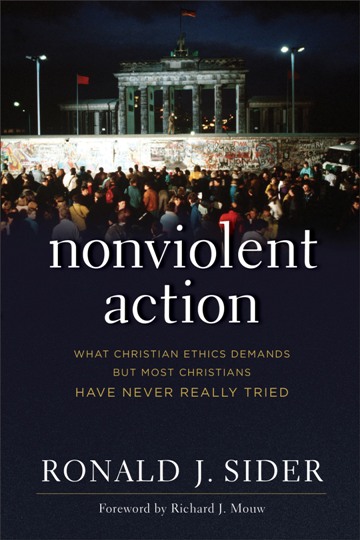Ronald Sider: Nonviolent Action
 Ronald J. Sider, Nonviolent Action: What Christian Ethics Demands But Most Christians Have Never Really Tried (Grand Rapids, Michigan: Brazos Press, 2015), 191+xvi pages, ISBN 9781587433665.
Ronald J. Sider, Nonviolent Action: What Christian Ethics Demands But Most Christians Have Never Really Tried (Grand Rapids, Michigan: Brazos Press, 2015), 191+xvi pages, ISBN 9781587433665.
In the book under review, Ronald Sider provides an alternative to the just war vs. pacifism discussion. Just war activists will accept “killing as the last resort” to overcome or end an oppressive, dictatorial regime. Pacifists would risk death in nonviolent confrontation and demonstration to bring about social and/or political change. Still, the just war vs. pacifism argument is unable to generate sustained social/political reconciliation, claims the president emeritus of Evangelical for Social Action and distinguished theology and ethics professor at Palmer Theological Seminary. With many examples, Sider shows that the twentieth century has become the “bloodiest of human history” (xiv). More importantly, Sider draws from a number of historical exemplars to encourage the pursuit of a just war policy that will also grant preference for nonviolent action where possible. Essentially, he invites Christians to head a call to nonviolent social action.
To be clear, Sider’s position of nonviolent action is not the same as passive nonresistance. As he puts it, coercion need not always be violent. In his view, nonlethal coercion (or a boycott or peaceful march) is not immoral or violent. Rather, nonviolence employs strategies and methods of persuasion. Some nonviolent strategies are verbal appeals. Others strategies are symbolic persuasion through forms of social, economic, and political noncooperation, boycotts, and strikes. Sider acknowledges his credit to Gene Sharp’s classic The Politics of Nonviolent Action, 3 volumes (Porter Sargent, 1973). He also credits William James as an antecedent to modern peacekeeping among other contributions (8). And without rigidly following the one hundred and ninety-eight tactics developed by Sharp, Sider explains: “concrete situations demand a unique mix of tactics” (xvi). Conceptually, nonviolent activists will respect opponents as they promote their cause. Self-sacrifice may be a necessary path.
Ron Sider provides an alternative to the just war vs. pacifism discussion.
Sider may have offered a too optimistic account of the history of successful nonviolence movement. For instance, if nonviolence as a paradigm has been truly effective, why is it that the World Wars in the twentieth century, and the genocide of Jews under Adolf Hitler’s regime could persist for so long before their eventual defeat (see Sider’s account, pp.8-11)? War and ethical historians may quibble with Sider’s brief treatment. Still, if one takes a macro-view of Christian attempts at justice, peace, and reconciliation projects, it is not too hard to follow and even agree with Sider’s basic thesis. Nonviolent action done right is better able to end dictatorship and social political oppression than aggressive, militaristic efforts to overthrow a regime.
Category: Ministry, Summer 2018


